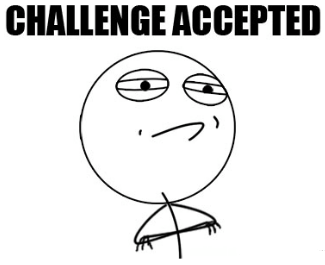What I've Learned (2008-2009)
After his first year of teaching,
Joe McClung wrote a blog post about his experience. He talks about how he overcame his mistakes and stumbling blocks as a new teacher. Since then, he has continued to write about his academic school years.

In his first blog, he explained the many challenges new teachers are faced with and how to conquer them. As a future teacher, I found that it is important for all educators, young and old, to know how to handle these situations correctly. In the beginning of his video, he talks about how important it is to remain positive when you begin teaching. Not everything is going to go prefect and new teachers shouldn't put that kind of pressure on themselves because they will begin to feel discourages. The situations may not be easy, but they are certainly manageable. How we choose to react to set backs and challenges in life determines our outcome and growth as educators and life as well.
Something interesting that Mr. McClung stated was that teachers don't have to have lesson plans that are solely student focused. In his thoughts, emphasizing too much on making sure the lesson is delivered will not be as effective is the student does not comprehend what is being taught. There's nothing wrong wit striving for perfection, but it's better that the students "get it" than having the perfect lesson. "
In order to be effective you have to be able to let your audience drive your instruction". I really like his quote because if you don't let your students influence your lesson plans, then they may be less inclined to listen to what you're trying to teach them. If you take things that they are familiar with and incorporated it into your lessons, they may take more interests in what you're saying and, most of all, have fun while learning.

A few more things that caught my attention is how Mr. McClung talks about how it is important for teachers to
be flexible,
don't be afraid of technology and
listen to your students.
Teachers need to be prepared to make spontaneous decisions. Personally, I have a hard time being flexible and spontaneous. I need structures to function, but I realize that as a future educator I must be prepared for any situation at any time. If something doesn't go according to plan, there's no need to fret. Be spontaneous, and go from there!

Honestly, I am intimidated by technology. But, with that being said, I have learned more and more about technology in EDM310 and I am growing more comfortable with it. Not every lesson needs to have technology incorporated in it, but it is nice to involve it from time to time. Technology is not going away any time soon, so teachers better just go ahead and start learning how to adapt to it and learn to use it. Not only do they need to know how to use it, they need to know how to use it so they can teach the kids how to use it effectively.

I think it's very important to listen to your students. How else are you going to know what your students are truly struggling with and their concerns in your classroom? I hope that, once I become an educator, I will be able to develop a bond with my students so that they will be comfortable enough with me to express their concerns in the class. Every student is different and unique in their own way and should have their voice be heard.
Mr. McClung encourages other teachers to never stop learning. As teachers, we should not only be "teaching" them, but learning with them as well. Sometime, students are the ones who teach lessons better than we could ever imagine. I know I learn a lot from my four year old class in the afternoons. They've taught me things better than most adults I know could. They are a blessing!
What I've Learned This Year (Volume 4, 2011-2012)
Mr. McClung's most recent blog he wrote this past June, the two main topics he writes about are "You Gotta Dance With Who You Came To The Dance With" and "Challenge Yourself".

He talks about how he struggled with seeing himself as a teacher. He knew where he stood with his students, but to his peer, he didn't feel like he matched up with them, but he had a realization that the only people he needed to be concerned about his reputation with are his students and his supervisors. As teachers, we have to remember that we are not working to please other teachers. What's the point of that? We are in the classroom to make a difference and inspire our students to be the very est we can be. If we are consumed with trying to please our peers, it's the kids who will catch the backlash of our insecurities. It's hard to ignore what our peers say or think about us, especially if it's negative, but we need to make sure that our students are thriving and growing instead of what others think. Not everyone is going to agree with another's beliefs. You got to learn to brush it off and remember why you are there in the first place.

It's easy to get settled in a comfort zone and a routine of doing things, but as teachers, that's something we need to be aware of. While having a routine is a good thing, it never hurts to change things up and be a little spontaneous. Mr. McClung talks about how, as teachers, we shouldn't get in a state of complacence. We need to challenge ourselves and branch out of our comfort zones. If we don't lead by example, how will our students know that its okay to take risks?
Overall, I'm glad Dr. Strange assigned us to ready and reflect on Mr. McClung's blogs. It helps to hear the experiences of new teachers and what they go through and feel in the work place. Thanks, Dr. Strange!
 My ideas of teaching have forever changed. In my first blog post I talked about how I was not entirely sure on how I would approach teaching in my future classroom. I knew I wanted lesson to be interactive, but I wasn't sure how to do so. I wanted my students to be curious and have a desire to learn, but I didn't know show to instill that in them. After this semester in EDM310, I have a much better idea of how I can achieve these goals for my future class.
My ideas of teaching have forever changed. In my first blog post I talked about how I was not entirely sure on how I would approach teaching in my future classroom. I knew I wanted lesson to be interactive, but I wasn't sure how to do so. I wanted my students to be curious and have a desire to learn, but I didn't know show to instill that in them. After this semester in EDM310, I have a much better idea of how I can achieve these goals for my future class.





























